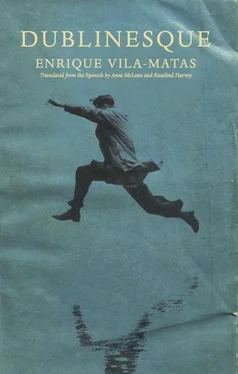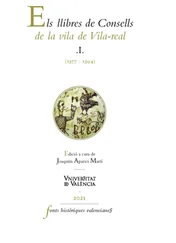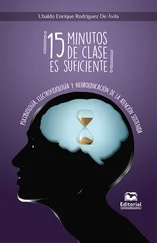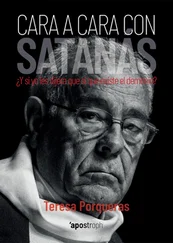As the cab drove across O’Connell Bridge Miss O’Callaghan said:
“They say you never cross O’Donnell Bridge without seeing a white horse.”
“I see a white man this time,” said Gabriel.
“Where?” asked Mr Bartell D’Arcy.
Gabriel pointed to the statue, on which lay patches of snow. Then he nodded familiarly to it and waved his hand.
This snippet reminds him of a phrase of Cortázar’s overheard mysteriously one day on the Paris Metro: “A bridge is a man crossing a bridge.” And shortly afterward, he wonders if when he goes to Dublin he wouldn’t like to go to see this bridge, where in an imaginary space he’s just located the link between the Gutenberg and the digital ages.
He observes that one of the two names of the bridge transcribed in the Spanish translation has to be wrong. It’s either O’Connell, or O’Donnell. Anyone who knows Dublin would surely resolve this in a fraction of a second. Yet more proof that he is still very green when it comes to Dublin, which isn’t an issue, but a stimulus, and — retired and dull teetotaller that he is — he needs incitements of all kinds. So now he decides that nothing would please him more than going into new subjects in depth; studying places he has yet to visit, and returning from these trips, continuing to study, studying then what has been left behind. He must make choices like this if he is to flee from being a computer nerd, and from the deep social hangover his years as a publisher have left him with.
In terms of finding the name of the bridge, the digital world is more use to him than the print one. He has no choice but to turn to Google, which isn’t serious, since it offers him the perfect excuse to hurl himself at the computer again. There he very quickly finds his answer. He searches first for O’Connell and the search result resolves everything straight away: “The walks and places of interest in the north of Dublin are mainly all clustered around the main street, O’Connell Street. It is the widest and busiest road in the city center, although not exactly the longest. It starts at O’Connell Bridge, mentioned in Dubliners by James Joyce.” He realizes he has another more modern edition of Dubliners in the study, which he could now take the trouble to consult and see if it has the same mistake of the bridge’s name. He gets up, leaves the computer for a few minutes — this morning he seems condemned to go from Gutenberg to Google, from Google to Gutenberg, moving back and forth between the two, between the world of books and that of the web — and he pounces on this more recent edition. Here the translation is not by Guillermo Cabrera Infante, but María Isabel Butler de Foley, and there is no confusion about the name of the bridge:
As the cab drove across O’Connell Bridge Miss O’Callaghan said:
“They say you never cross O’Connell Bridge without seeing a white horse.”
. .
Gabriel pointed at the statue of Daniel O’Connell, on which patches of snow had settled. Then he greeted it familiarly waving his hand.
Compare two translations and this sort of thing happens. Mr. Daniel O’Connell, the Dublin statue, has just made a dazzling appearance in Riba’s life. Where has he been up till now? Who is he? Who was he? Any excuse to go back to the computer screen, the only place where, without leaving the house, he has a chance of finding the text of “The Dead” in English, and so discover if Daniel O’Connell was there.
He goes back to his hikikomori position. He searches, and solves the mystery in no time. Daniel O’Connell does not appear in the original: “Gabriel pointed to the statue, on which lay patches of snow. Then he nodded familiarly to it and waved his hand.”
He recalls that someone once suggested that the truly mysterious path always leads within. Was it Celia who said this in a profound Buddhist outburst? He doesn’t know. He’s here now, in their little apartment, awaiting possible events. He has an aptitude for waiting, and has started waiting for this trip to Dublin to somehow take shape. He considers waiting the essential human condition and sometimes will act accordingly. He knows that from today onward, until the sixteenth of June, he will do nothing but be in a state of waiting to go to Dublin. He will wait conscientiously. He has no doubts about managing to prepare himself for the journey.
Now he’s really focused, as if he were a samurai about to go on a long journey. He’s in his hikikomori pose, but ignoring the screen and heading deeper down an inner path, strolling about through a few memories. The memory of the times he’s read Ulysses in the past. Dublin is at the end of the path and it’s pleasant to recall the old music of this splendid book he read with a mixture of amazement and fascination. He’s not quite sure, but he’d say that Bloom, at heart, is very similar to him. He’s the personification of the classic outsider. He has some Jewish roots, as does Riba. He’s a stranger and a foreigner at the same time. Bloom is too self-critical and not imaginative enough to be successful, but too much of a hard worker and teetotaller to fail completely. Bloom is far too foreign and cosmopolitan to be accepted by the provincial Irish, and too Irish not to worry about his country. Riba likes Bloom a lot.
•
“Downtown Train,” by Tom Waits, is playing. He can’t understand English, but it seems to him that the lyrics are about a train heading for the city center, a train carrying its passengers away from the remote neighborhood they grew up in and where they’ve been trapped for their whole lives. The train is going to the center. Of the city. It might be going to the center of the world. To New York. It’s the train to the center. He can’t even conceive that this song is not about a center.
Believing this is the subject of that Tom Waits song, he has never grown tired of listening to it. Waits’s voice has for him the poetry of a local train linking his childhood neighborhood to New York. Every time he listens to the song, he thinks of past trips, of everything he had to leave behind in order to devote himself to publishing. Now, the older he feels, he remembers his old zeal, his initial literary preoccupations, how for years he devoted himself endlessly to the dangerous business of publishing, so often ruinous. He relinquished youth for the honest labor of an imperfect catalog. And what’s happening now that everything has come to an end? He is left feeling very puzzled and with an empty wallet. Wondering why. A wild remorse at night. But no one can take away the fact that he toiled, and it took him far. And that is no small thing. In the end, as W. B. Yeats said, in luck or out, the toil has left its mark.
I’m all washed up, he thinks. But it would be worse if someone decided to light the lamps of my existence. It would be no good at all if something happened and everything livened up and the house turned into an exalted sideshow and I turned into the center of a vibrant novel. Nevertheless I can see it coming, something will happen soon, I’m sure of it. Suddenly, someone will burst into my monotonous life as an old man who walks barefoot around the house, without turning on any lights, and stands still sometimes, leaning against some piece of furniture in the dark while listening to the mice scurrying about. Something’s going to happen, I’m sure, my life will be turned upside down and my world will turn into a sparkling novel. If that happened, it would be awful. I don’t think I’d like to be separated from the unsurpassable charm of my current life. I would be happy only to go and live in New York, but leading a simple existence there too, always in contact with the sedate ordinariness of everyday life.
Читать дальше












